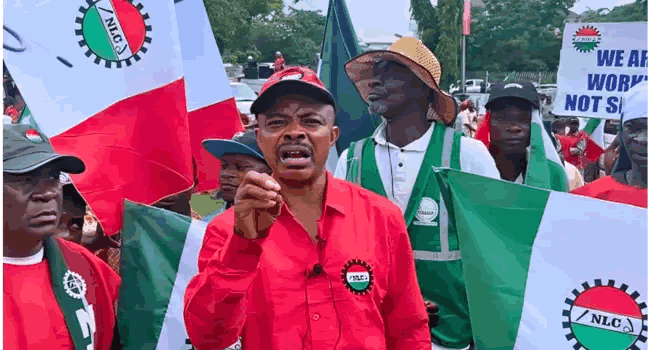There are strong indications that organized labour unions in Nigeria may commence a nationwide strike on Monday, June 3, over a stalemate in the negotiations for a new minimum wage. This development comes as the tripartite committee on the National Minimum Wage (NNMW) reconvenes today following a disrupted meeting last Tuesday when labour representatives walked out, accusing government negotiators of not taking the process seriously.
Sources suggest that state governors are being blamed for allegedly obstructing the ongoing negotiations by opposing the Federal Government’s efforts to resolve the issue.
Last Tuesday marked the second time in two weeks that labour’s negotiating team, comprising representatives from the Nigeria Labour Congress (NLC) and the Trade Union Congress of Nigeria (TUC), staged a walkout from the committee meeting. The Federal Government had marginally increased its offer to N60,000 from N57,000, which was previously proposed on May 22. Labour had earlier rejected the government’s offer of N48,000 and the Organised Private Sector’s offer of N54,000, standing firm on their demand for N615,000.
The meeting is set to reconvene today, as per a letter from Ekpo Nta, member/Secretary of the committee on behalf of the National Salaries, Incomes and Wages Commission (NSIWC). The letter invited participants to the 7th meeting of the Tripartite Committee on National Minimum Wage scheduled for today at Nnamdi Azikiwe Hall, Nicon Luxury Hotel in Abuja.
Sources within the labour unions have indicated that a nationwide strike could begin on Monday, depending on the outcome of today’s meeting. A labour leader, speaking anonymously, emphasized that if the government’s team continues to disregard workers’ welfare, the unions are prepared to initiate industrial action.
“We have been patient amid the hardship and mass suffering inflicted by the government’s anti-poor policies. The issue of the minimum wage is statutory, and the old Minimum Wage Act ceased to exist on April 18. We had more than six months to work on a new minimum wage, but the government has not been serious about issues affecting workers,” the labour leader stated.
Reports also suggest that organized labour is aware of a possible gang-up by state governors to stall the negotiations. As a result, they are preparing a series of industrial actions, including a total shutdown of the nation’s economy, to expedite the process.
A Presidency source disclosed that the reluctance of many state governors to agree to a reasonable new national minimum wage is putting pressure on the Federal Government. Despite acknowledging the high demands of labour, the Federal Government is also under pressure from state governors who claim they lack the resources to meet these demands.
Reacting to these developments, a labour representative highlighted that the Federal Government’s inclusion of certain state governors, who have not fully implemented the N30,000 minimum wage, in the tripartite committee has compounded the issue.
Meanwhile, the Federal Government has appealed to organized labour to consider its current offer. Minister of State for Labour and Employment, Nkeiruka Onyejeocha, urged labour unions to be considerate and patriotic in their demands, noting that the nation’s economy is still recovering from the impacts of the COVID-19 pandemic and other economic challenges.
“We appeal to organized labour and other stakeholders to be considerate in their demands, recognizing that our economy is still recovering. We are committed to ensuring our economic policies benefit all Nigerians. The government remains dedicated to prioritizing the well-being of our citizens and urges all relevant parties to demonstrate patriotism and understanding,” Onyejeocha said.
The minister noted that the recent meeting with labour was a significant step in the ongoing efforts to secure a fair and realistic wage for Nigerian workers. She expressed optimism that continued engagement would yield a positive outcome, highlighting the government’s concessionary move from N57,000 to N60,000 as a demonstration of willingness to address labour’s concerns.


